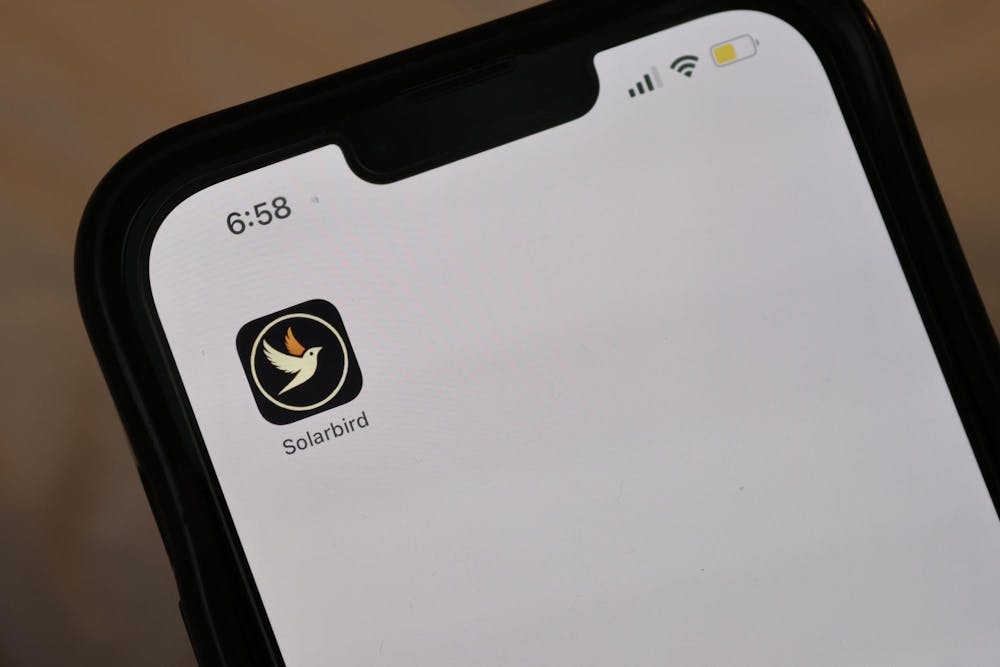The solar eclipse that will descend over Bloomington on April 8 has triggered the city and university to cancel classes, close streets, and prepare for the arrival of hundreds of thousands of visitors eager to take advantage of Bloomington’s position in the path of totality.
By contrast, the eclipse will come as a total surprise to local animals. That’s why Ph.D. candidate Liz Aguilar, a student in associate professor Kim Rosvall’s department of biology lab, sees the eclipse as an opportunity to learn how animals — specifically birds — respond to environmental anomalies.
Aguilar, who specializes in bird behavior, set out in summer 2023 to find a system to gather large volumes of data on the eclipse’s effects on local birds’ daily routines. With the help of Luddy School resources, that system became SolarBird: a smartphone app intended for observing bird responses to Monday’s eclipse.
“The research out there from past events like this is pretty limited in scope, just because when an eclipse occurs, it covers a huge part of the country,” Aguilar said. “Scientists can’t be in a thousand places at once, so there’s only so much you can do to research.”
SolarBird seeks to address these constraints on research volume by enlisting the help of what Aguilar calls “community scientists.” The app’s users can find a bird in their environment and observe its behavior for 30 seconds before, during, and after totality. Users will then attribute to their observed bird any pre-selected predicted behaviors listed in the app.
One of the team’s priorities was maximizing ease for app users. They hoped making SolarBird as convenient as possible would help them collect at least 1,000 observations over the course of the eclipse. Community scientists do not need to pick the same bird to observe over the three separate time intervals: The goal is to identify general trends in behavior, actions that Aguilar predicts will mirror birds’ nighttime routines, which can vary based on species.
“You just select what you’re observing — there will be a little prompt to estimate the size of the bird, and that will be the full observation,” Aguilar said. “Nobody needs to be a bird expert, or really have any prior knowledge in order to submit observations.”
Ensuring SolarBird’s simplicity of use was no easy task. Luddy master’s student Sean Dixit, a lead developer on the project, detailed an array of challenges he faced while executing Aguilar’s vision, from an exceptionally fast 2.5-month development timeline to navigating Apple and Android’s complex legal policies for new apps.
“We were definitely overwhelmed,” Dixit said. “But we stepped up to the plate.”
Many of the more unfamiliar dimensions of app development for Dixit, whose usual work relates to the intersection of AI and genomics, ultimately made the process more gratifying. He credited the uniquely cross-disciplinary nature of the project with helping make the process of bringing SolarBird to life particularly “euphoric.”
For Luddy associate professor and Associate Dean of Undergraduate Education Paul Macklin, who took on a mentorship role with SolarBird’s development, the project’s collaborative nature was similarly exciting.
“I’ve always been drawn to really interdisciplinary projects,” Macklin said.
He called SolarBird “pretty unique” in the scope, level and closeness of interaction between the College of Arts and Sciences and the Luddy School.
“We had different leaders in different schools trying to make this happen,” Macklin said. “I’d like to think that this is a prototype for that type of interaction…I really want to see [Luddy] students working with faculty [in the College] and vice versa to solve cutting-edge problems.”
Aguilar and Dixit hope SolarBird can be a beginning for animal behavior research. With Monday’s findings, Aguilar seeks to craft a paper that begins establishing patterns of bird behavior in response to eclipses, recognizing all members of SolarBird’s development process as co-researchers.
Dixit would like to see SolarBird’s technology used for future eclipses to help advance animal behavior research.
“I keep trying to tell people just to really engage with the moment on Monday, and not just look up at the eclipse... but really take stock of what’s happening around you in your environment,” Aguilar said.
SolarBird can now be downloaded for free on iOS or Android devices.




